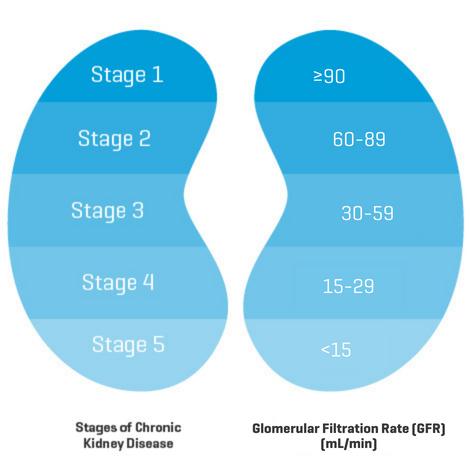Chronic kidney disease stage 5
CKD stage 5 indicates kidney failure and is also known as end-stage kidney disease. At this stage, you should have made decisions and plans regarding kidney replacement therapy such as dialysis. If CKD is only discovered at this stage, it needs quick action from the nephrology team.

An overview of stage 5 kidney disease
There are 5 stages of chronic kidney disease (CKD). These stages are determined through assessment of kidney function, and whether there are signs of blood or protein in the urine.
At CKD stage 5, the kidneys will be struggling to remove toxins and fluid well, with potential swelling and shortness of breath. A blood test to determine kidney function at CKD stage 5 gives an estimated glomerular filtration rate (eGFR) of less than 15 ml/min. (The eGFR is an indication of kidney function.) There will be signs of other health issues related to kidney disease, such as anaemia and metabolic bone disease.
At stage 5, it is time to move to kidney replacement therapy (dialysis or transplant), or conservative care. Your kidneys can no longer keep up with removing waste products and extra water. There is permanent and irreversible damage, and you require another method of removal of waste and excess water.
You are likely to be in the care of a nephrologist and pre-dialysis nurse, with whom you’ve discussed options for when this stage was reached.
Symptoms of stage 5 kidney disease
At CKD stage 5, you are likely to be experiencing symptoms and these may include:
- Fatigue
- Shortness of breath
- Swelling in your hands and feet
- Puffy eyes
- Change in urine colour or volume
- Muscle cramps
- Loss of appetite
- Nausea and bad taste in the mouth
- Trouble sleeping
- Itch
- Discolouration of nails and skin
It’s important to be aware of the symptoms of kidney failure and to inform your doctors and nephrology team regarding any new changes or symptoms.
Fatigue and loss of appetite are two crucial symptoms at this stage, and it is important to keep a watch out for these symptoms.

Diagnosis at stage 5 kidney disease
If you are first diagnosed with CKD at stage 5, you will need to urgently see a kidney specialist, a nephrologist, in order to assess the underlying kidney problem and to discuss the necessary treatment options. This can be an extremely stressful and anxious time and it is important to gather all the information on potential plans for your treatment.
Find out important questions to ask when meeting your nephrologist to make an informed decision about your kidney disease treatment.

Treatment for stage 5 kidney disease
At CKD stage 5, end-stage kidney disease has been reached. It is likely that you will be prescribed a range of medication to not only help kidney function but also to manage other health issues that CKD causes, such as anaemia and bone disease (related to vitamin D levels and retention of phosphate). Your nephrology team would have assessed you and discussed the treatment options available before you progress to this stage – in particular, dialysis and kidney transplant.
Every patient is unique, so your conditions and preferences will be considered before deciding on the kidney replacement therapy best suited for you, or if perhaps conservative care is the option for you. By this time, whatever path you are choosing, plans should be in place for you to begin.
This may include creating your dialysis access, counselling, preparation for transplant and dialysis training.
Kidney disease treatment options: dialysis, transplant and conservative care
If you have stage 5 kidney disease, you will need to choose from 3 options:
-
Undergo dialysis, on top of medications. Dialysis is a medical process that mimics the functions of healthy kidneys by removing toxins and excess water from the body.
-
Have a kidney transplant, if you are appropriate and have a suitable donor
-
Prepare mentally and emotionally for conservative care
The two main types of dialysis are haemodialysis (HD) and peritoneal dialysis (PD). Typically, PD is performed at home while HD can be performed in a centre or at home. It is important to know that over the next years, you may want or need to switch between the different types of dialysis, depending on your clinical condition and your own preferences.
The nephrology team will also be assessing if you are able to receive a kidney transplant. In some situations, if dialysis and kidney transplant may not be the best option for you, you may consider conservative care. Conservative care controls your symptoms with medication, and the focus is on your comfort and quality of life.

Managing stage 5 kidney disease
Proper chronic kidney disease management is vital to improving your quality of life, therefore you should maintain a regular exercise routine and follow the recommended diet. You should also stop smoking and monitor your other health conditions. At CKD stage 5, you will be visiting hospitals frequently to monitor your kidney condition. You should also start your kidney replacement therapy when needed.
When is kidney replacement therapy started?
Your nephrologist will assess when it is the best time to start dialysis. The decision will be based on your symptoms and blood tests results. There is no hard and fast rule as to when you should start dialysis. The treatment should be tailored based on your lifestyle and life goals.
People who are diagnosed with stage 5 kidney disease will need quick clinical assessments and may need to start urgently on dialysis.
FREQUENTLY ASKED QUESTIONS
My Kidney Journey Newsletter
Sign up now to receive exclusive content on kidney disease, treatment options, lifestyle tips and inspiring patient stories.
